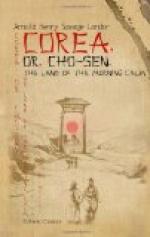Going along at a good pace I reached the half-way house, a characteristically Corean building, formerly used as an inn, and now being rented by a Japanese. Having entertained myself to tea and a few items of solid food, I proceeded on my pedestrian journey towards the capital. And now, as I gradually approached the river Han, more attention seemed to be given to the cultivation of the country. The staple product of cereals here is mainly buckwheat, beans and millet, a few rice-fields also being found nearer the water-side. Finally, having arrived at the river-side, after shouting for half an hour to the ferry boatman to come and pick me up, I in due course landed on the other side. The river Han makes a most wonderful detour between its estuary and this point. As the river was left behind, more habitations in the shape of miserable and filthy mud-huts, with thatched roofs, became visible; shops of eatables and native low drinking places following one another in continuation; and crowds of ponies, people, and oxen showed that the capital was now being fast neared; and sure enough, after winding along the dirty, narrow road, lined by the still dirtier mud huts for nearly the whole of the distance between Mafu, the place where the Han river was ferried, and here, a distance of about three miles, I found myself at last in front of the West Gate of the walled city of Seoul.
I could hear quite plainly in the distance, from the centre of the town, the slow sound of a bell; and men, women and children, on foot or riding, were scrambling through the gate in both directions. As I stopped for a moment to gaze upon the excited crowd, it suddenly flashed across my mind that I had been told at Chemulpo, that to the mournful sound of what is called the “Big bell” the heavy wooden gates lined with iron bars were closed, and that no one was thereafter allowed to enter or go out of the town. The sun was just casting his last glorious rays on the horizon, and the excitement grew greater as the strokes of the bell became fainter and fainter, and with the mad crowd of men and beasts mixed together upon it, the road might be compared with the tide entering the mouth of a running river. I threw myself into the thick of the in-going flow, and with my feet trampled upon by passing ponies; now knocking against a human being, now face to face with a bull, I finally managed to get inside. Well do I remember the hoarse voices of the gate-keepers, as they shouted out that time was up, and hurried the weary travellers within the precincts of the royal city; well also do I recollect, as I stood watching their doings from the inside, how they pushed back and ill-treated, with words and kicks, the last people who passed through, and then, out of patience, revolved the heavy gates on their huge and rusty hinges, finally closing the city until sunrise next day. Shouts of people, just too late, on the other side, begging to be let in, remained unacknowledged, and the enormous padlocks and bolts




